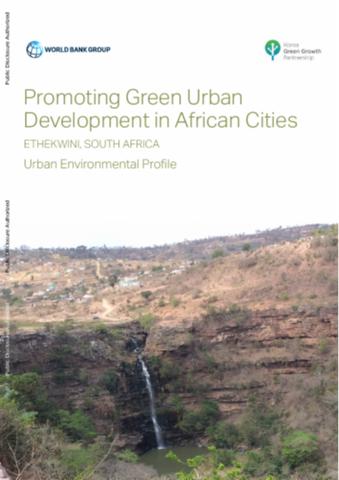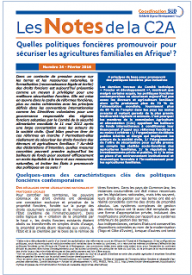UNDERNUTRITION IN MYANMAR Part 2: A Secondary Analysis of LIFT 2013 Household Survey Data
Executive Summary:
UNDERNUTRITION IN MYANMAR Part 1: A Critical Review of Literature
Abstract:
Promoting Green Urban Development in African Cities
The city of eThekwini or Durban has undergone a period of rapid urbanization that has contributed to the degradation of the city’s natural environment. Climate change is placing further strains on the city’s ability to manage the urban environment. The urban environmental profile of eThekwini has been prepared as the first component of the assignment promoting green urban development in Africa: enhancing the relationship between urbanization, environmental assets and ecosystem services, a project being conducted under the leadership of the World Bank.
Does investment in motor pump-based smallholder irrigation lead to financially viable input intensification and production? An economic assessment
Quelles politiques foncières promouvoir pour sécuriser les agricultures familiales en Afrique ?
Dans un contexte de pression accrue sur les terres et les ressources naturelles, la formalisation (reconnaissance légale et écrite) des droits fonciers est aujourd’hui présentée comme un moyen à privilégier pour une meilleure sécurisation foncière.
City Risk Diagnostic for Urban Resilience in Indonesia
In 2012, the World Bank initiated the
building urban resilience in East Asia program, aimed at
increasing the resilience of cities to disasters and the
impact of climate change by using a risk-based approach to
making public investment decisions. The objective is to
demonstrate a scalable methodology and practical tools for
risk assessment that can be used for city-level investment
decisions. This activity started with engaging selected
Improved Nutrition through Agricultural Extension and Advisory Services
Even after several decades of green
revolution, malnutrition continues to be a major development
challenge in much of South Asia, and India has a major share
of the malnourished people in the region. For nutrition
goals to be integrated into extension the curricula provided
to current and future agricultural extension agents must be
revisited. As part of the South Asia Food and Nutrition
Security Initiative (SAFANSI), this paper focuses on
Kazakhstan Agricultural Sector Risk Assessment
Agriculture is among the most risk-prone
sectors in the economies of Central Asia. Production shocks
from weather, pests and diseases and adverse movements in
agricultural product and input prices not only impact
farmers and agri-business firms, but can also strain
government finances. Some of these risks are small and
localized and can be managed by producers. Others are the
result of more severe, exogenous shocks outside agriculture
Tajikistan Agricultural Sector Risk Assessment
Agriculture is among the most risk-prone
sectors in the economies of Central Asia. Production shocks
from weather, pests and diseases and adverse movements in
agricultural product and input prices not only impact
farmers and agri-business firms, but can also strain
government finances. Some of these risks are small and
localized and can be managed by producers. Others are the
result of more severe, exogenous shocks outside agriculture
Kyrgyz Republic Agricultural Sector Risk Assessment
Agriculture is among the most risk-prone
sectors in the economies of Central Asia. Production shocks
from weather, pests and diseases and adverse movements in
agricultural product and input prices not only impact
farmers and agri-business firms, but can also strain
government finances. Some of these risks are small and
localized and can be managed by producers. Others are the
result of more severe, exogenous shocks outside agriculture
L'agriculture française à l'heure des choix
L’agriculture française affiche des résultats insatisfaisants : un emploi qui diminue, des revenus faibles dans certaines activités, un environnement qui se dégrade de façon patente et une performance commerciale qui s’érode. Dans cette Note du CAE, les trois auteurs Jean‐Christophe Bureau, Lionel Fontagné et Sébastien Jean livrent leur constat et pointent les écueils des politiques publiques dédiées à ce secteur.







